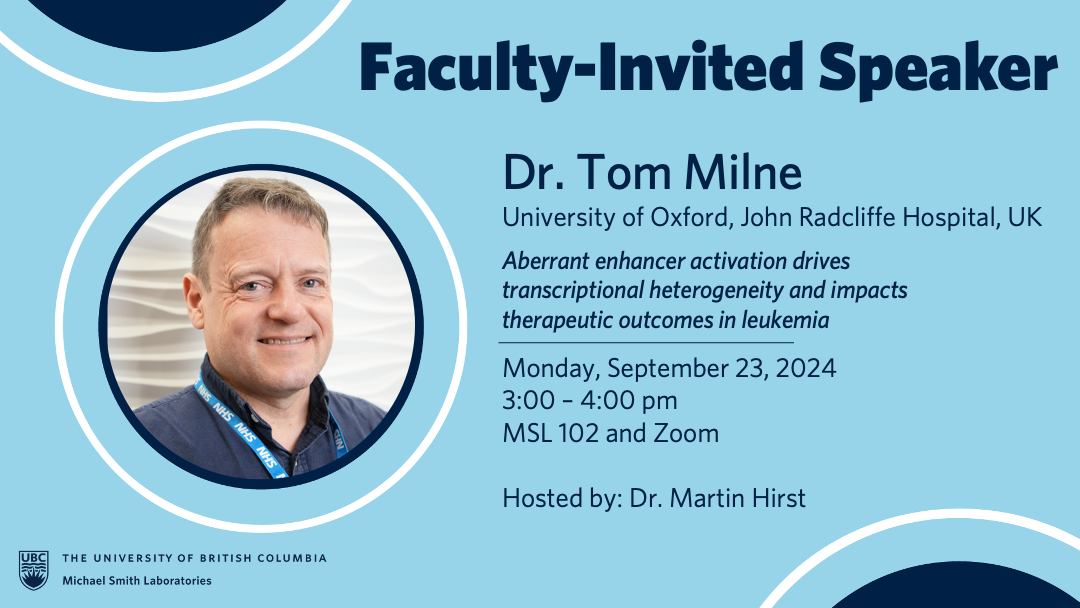
- This event has passed.
Faculty-Invited Speaker: Dr. Tom Milne
September 23, 2024 @ 3:00 pm - 4:00 pm

Dr. Tom Milne from the University of Oxford and the John Radcliffe Hospital, UK will be delivering a talk on September 23 from 3:00 – 4:00 pm in the MSL seminar room (MSL 102). This visit has been organized by Dr. Martin Hirst.
If you are unable to attend in person, the talk will be presented in a hybrid format, and we invite you to register at the following Zoom link: https://ubc.zoom.us/meeting/register/u5Uuc-mupz0oGdHR-xy_OvrCoJdHnccwcHkI
After registering, you will receive a confirmation email with information for joining the meeting.
Talk title: Abberant enhancer activation drives transcriptional heterogeneity and impacts therapeutic outcomes in leukemia
Abstract: One goal of modern medicine is to provide cancer treatments that impact cancer cells while leaving healthy cells unaffected. To do this, much work has gone into targeted therapies that can be effective as well as being relatively non-toxic. Unfortunately, even though many targeted therapies have a much improved patient response rate, many patients still either fail to respond or relapse for reasons that are not always clear. Genetic mutations alone cannot account for the diverse phenotypes of cancer cells. Even cancers with the same driver mutations show significant transcriptional heterogeneity and varied responses to therapy. Aberrant transcription is a hallmark of many cancers, including MLL-AF4 acute lymphoblastic leukemia (ALL), an aggressive leukemia subtype with a poor prognosis in children and a nearly mutationally silent genetic landscape. Despite the low mutational burden, MLL-rearranged leukemias exhibit substantial transcriptional heterogeneity between individuals. In recent work, we have found that aberrant enhancer activity is the main driver of MLL-AF4 leukemogenesis, and differential enhancer usage drives much of the transcriptional heterogeneity observed in patients. This has implications for the effectiveness of new MLL-AF4 therapies, including a novel CAR-iNKT immunotherapy we recently developed in collaboration with several other labs. In addition, preliminary data suggests variable enhancer usage is a common driver of transcriptional heterogeneity in multiple leukemias, suggesting this could be one common mechanism underpinning aspects of patient heterogeneity across different cancer subtypes.
Bio: Tom Milne received a PhD in 2005 that was co-supervised by Dr. Hugh Brock (University of British Columbia) and Dr. Jay Hess (University of Pennsylvania, Philadelphia, USA) working on the wild type function of the Mixed Lineage Leukaemia (MLL) gene, where he discovered that the MLL protein is a histone methyltransferase. Tom went on to do postdoctoral studies at The Rockefeller University (NY, USA) with Dr. C. David Allis where he found that MLL and the polymerase associated factor 1 (PAF1) proteins directly interact and cooperate in regulating gene targets in leukaemia. He then became a Group Leader in 2010 at the MRC Molecular Haematology Unit (MRC Weatherall Institute of Molecular Medicine, The University of Oxford, Oxford, UK) an Associate Professor of Haematology in 2014, and a full Professor in 2022. Current work in the Milne lab is to discover how epigenetic systems are leveraged in cancer to create pathogenic gene expression states and to use this basic knowledge to develop new targeted therapies. The main focus of the lab is on high-risk infant and childhood acute lymphoblastic leukaemias (ALLs), the most common form of paediatric cancer, for which relapse and refractory disease is largely untreatable. Tom is also a co-founder, shareholder and consultant for the spinout companies OxStem Oncology (2016-2021) and Dark Blue Therapeutics (2021 – present).